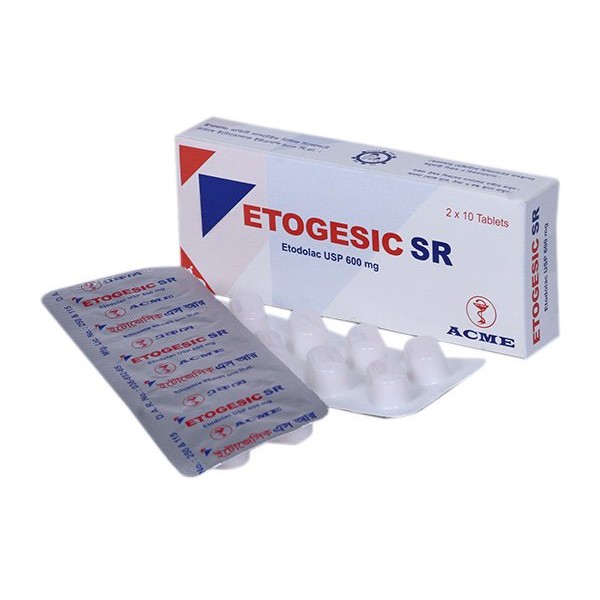
- Stock: In Stock
- Brand: Acme Laboratories Limited
- Product ID: Etodolac
100% Secure Payment

Etogesic SR 600 mg Tablet
Indications
Carefully consider the potential benefits and risks of etodolac capsules and other treatment options before deciding to use etodolac capsules. Use the lowest effective dose for the shortest duration consistent with individual patient treatment goals. Etodolac are indicated in:
The acute and long-term use in the management of signs and symptoms of osteoarthritis, rheumatoid arthritis
The management of acute pain
Therapeutic Class
Drugs for Osteoarthritis, Drugs used for Rheumatoid Arthritis, Non-steroidal Anti-inflammatory Drugs (NSAIDs)
Pharmacology
Etodolac is a non-steroidal anti-inflammatory drug (NSAID). It inhibits the formation of prostaglandins. The inhibition of prostaglandin synthesis observed with Etodolac differs from that of other NSAIDs. Studies in human cell models have confirmed that Etodolac is selective for the inhibition of COX-2. Experiments have shown Etodolac to have marked anti-inflammatory activity, being more potent than several clinically established NSAIDs.
Dosage & Administration
Carefully consider the potential benefits and risks of Etodolac and other treatment options before deciding to use Etodolac capsules. Use the lowest effective dose for the shortest duration consistent with individual patient treatment goals.
After observing the response to initial therapy with Etodolac capsules, the dose and frequency should be adjusted to suit an individual patient’s needs.
Dosage adjustment of Etodolac is generally not required in patients with mild to moderate renal impairment. Etodolac should be used with caution in such patients, because, as with other NSAIDs, they may further decrease renal function in some patients with impaired renal function.
Analgesia: The recommended total daily dose of Etodolac for acute pain is up to 1000 mg, given as 200 to 400 mg every 6 to 8 hours. Doses of Etodolac greater than 1000 mg/day have not been adequately evaluated in well-controlled clinical trials.
Osteoarthritis and Rheumatoid Arthritis: The recommended starting dose is 300 mg b.i.d., t.i.d., or 400 mg b.i.d., or 500 mg b.i.d. A lower dose of 600 mg/day may suffice for long-term administration. Physicians should be aware that doses above 1000 mg/day have not been adequately evaluated in well-controlled clinical trials.
In chronic conditions, a therapeutic response to therapy with Etodolac is sometimes seen within one week of therapy, but most often is observed by two weeks. After a satisfactory response has been achieved, the patient’s dose should be reviewed and adjusted as required.
Interaction
Since Etodolac is extensively protein-bound, it may be necessary to modify the dosage of other highly protein-bound drugs. The concomitant administration of Warfarin and Etodolac should not require a dosage adjustment of either drug, however it has rarely led to prolonged prothrombin times, therefore caution should be exercised when Etodolac is administered with Warfarin. Concomitant use of Ciclosporin, Methotrexate, Digoxin, or Lithium with NSAIDs may cause an increase in serum levels of these compounds and associated toxicities. Care should also be taken in patients treated with any of the following drugs as interactions have been reported in some patients: Anti-hypertensives, Mifepristone, other Analgesics, Corticosteroids and Quinolone Antibiotics.
Contraindications
Etodolac is contraindicated in patients with known hypersensitivity to Etodolac. Etodolac should not be given to patients who have experienced asthma, urticaria or other allergic-type reactions after taking Aspirin or other NSAIDs.
Side Effects
The common side effects of Etodolac involve the gastrointestinal system. It can cause abdominal pain, constipation, diarrhea, dyspepsia, flatulence, heartburn, nausea, GI ulcers, vomiting. Other events including abnormal renal function, anemia, dizziness, edema, elevated liver enzymes, headaches, increased bleeding time, pruritis, rashes, tinnitus etc.
Pregnancy & Lactation
Pregnancy: There are no adequate and well-controlled studies in pregnant women. It should be use in pregnancy only if the potential benefit justifies the potential risk to the fetus.
Lactation: It is not known whether Etodolac is excreted in human milk. A decision should be made whether to discontinue nursing or to discontinue the drug taking into account the importance of the drug to the mother.
Precautions & Warnings
Etodolac should be given with caution in patients with severe hepatic reactions, pre-existing asthma, fluid retention, hypertension or heart failure. If clinical sings and symptoms consistent with liver disease develop, or if systemic manifestations occur (e.g. eosinophilia, rash etc.), it should be discontinued.
Overdose Effects
Symptoms following acute NSAID overdose are usually limited to lethargy, drowsiness, nausea, vomiting, and epigastric pain which are generally reversible with supportive care.






























